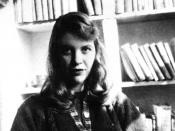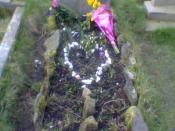Sylvia Plath, only became well-known to the literary community after her tragic death in 1963. Her unusual blend of different literary devices combined with her very emotional background, combine to create pieces of work that are appealing to all readers. "Sylvia Plath, was one who was able to make the words come alive, have them sing to the reader"ÃÂ (Oates). In "Daddy"ÃÂ by Sylvia Plath, the author illustartes her feelings of anger and resentment towards her father and husband along with her feelings about being oppressed for most of her life through powerful images.
Plath's poem "Daddy" tells about the author's feelings of oppression since her childhood, along with the theme of male domination in her life. These feelings can be traced back to the death of her father and her husband leaving her for another woman while "Daddy" was being written (Ramazani). The main theme behind this poem is male authority from father and husband, versus the right of a female, the speaker, to control her own life and be free of this domination that has affected her all of her life.
Plath's conflicts begin with her father and brought into her relationship between Pl ath and her husband. This conflict can be seen in lines 71-80 of "Daddy" in which Plath compares the damage her father caused to that of her husband: And I said I do, I do.
So daddy, I'm finally through.
The black telephone's off at the root, The voices just can't worm through.
If I've killed one man, I've killed two--- The vampire who said he was you And drank my blood for a year, Seven years, if you want to know.
Daddy, you can lie back now.
There's a stake in your fat black heart And the villagers never liked you They are dancing and stamping on you They always knew it was you Daddy, daddy, you bastard, I'm through The short stanzas, which contain powerful imagery, of vampires, nazis, and the holocaust, which overwhelm the readers, forcing them to imagine the "oppression" that the speaker went through in her short life. The tone of this poem is that of an adult full of anger and outrage, one who oftentimes speaks with a childlike dialect. This dialect can be seen by the structure the author writes part of the poem in. Plath uses a rhyme scheme in lines 55-85. This childlike attitude is also viewed when the speaker continually uses the word "Daddy" and repeats herself often. The last two stanzas of the poem portray a dismal picture of a life for a woman who is continuously under a dominating male figure. These stanzas seem to show that the speaker has reached a resolution after being kept under a man's thumb all her life: If I've killed one man, I've killed two--- The vampire who said he was you And drank my blood for a year, Seven years, if you want to know.
Daddy, you can lie back now.
There's a stake in your fat black heart And the villagers never liked you.
They are dancing and stamping on you.
They always knew it was you.
Daddy, daddy, you bastard, I'm through In lines 71-80 the speaker compares her father and husband to vampires, a very powerful image, saying how they betrayed her and "drank her blood--sucking her dry of life". She tells her father to give up and be done, to lie back (line 75) and in line 80, she says, "Daddy, daddy, you bastard, I'm through," a very harsh and direct tone. A very powerful way to end this type of poem The speaker begins to eliminate all of her childish feelings and come to the realization that she was being dominated all of her life. Lines 72 through 74 The vampire who said he was you And drank my blood for a year, Seven years, if you want to know.
describes her husband and his ability to tear her self esteem down to nothing. Plath was married to her husband for seven years during which he had an affair with another woman (DeLong). He had drained her by drinking her blood, or figuratively sucking the life out of her. In line 75, Plath states, "Daddy, you can lie back now," as if to say the damage is done. "There's a stake in your fat black heart and the villagers never liked you," is a direct image of vampires because stabbing them with a stake to the heart is the only way they will die.
The villagers can be thought of as another persona for Plath who has gotten over her resentment of her father and now has just decided to forget about him. She finishes the poem with a very powerful statement, "Daddy, daddy, you bastard, I'm through" "ÃÂ showing her dead father that she has reached a resolution and freedom.
"Daddy" is a poem in which Plath is almost declaring her independence, almost like Whitman does in "Song for the Open Road." Both of these poems gave a clear-cut theme the authors are trying to present, freedom. Along with similar themes, these poems, the authors are both writing with similar structures, with short stanzas. Both authors speak about something better, but still tell about the past. Plath tells the readers that she is free from the male domination that has controlled her for her enti re life. She had gone from one man, her father, to another, her husband, which in the poem she manages to make one in the same person. Plath's writing has always been compelling to read because of her emotional background and her use of literary devices.
Works Cited Connell, Elaine. Sylvia Plath's Daddy and Other Poems Online. 27 Sept. 1997.
http://www.sylviaplathforum.com/ DeJong, Mary G. "Sylvia Plath and Sheila Ballantyne's Imaginary Crimes." Studies in American Fiction 16. New York: Harvest Books, 1988 Oates, Joyce. "Sylvia Plath: A Biography." Poetry March 1991 Ramazani, Jahan. "Daddy I Have Had to Kill You': Plath, Rage, and the Modern Elegy." Publications of the Modern Language Association of America. St. Louis: Stevenson Press, 1993 Whitman, Walt. "Complete Poetry and Selected Prose." New York: Houghton Mifflin College Press, 1969





